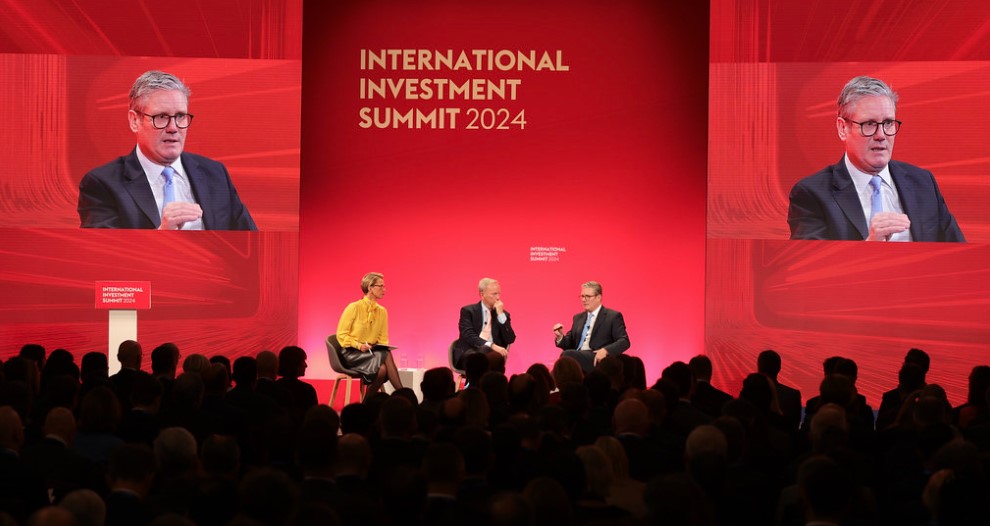Economic growth – or resilience?
The prime minister’s speech to the International Investment Summit last week assured the wealthy folk who had flown so far in their private jets that he shared an ambition with them.
Growth.
Whether the “Masters of the Universe” were impressed or not, only time will tell. But just looking at the big shocks coming down the line, it’s at least fair to ask whether the Government should be seeking economic growth when economic resilience might be wiser.
It’s not a pretty picture. As someone recently remarked, back in the late-1930s, people had to worry about the rise of fascist dictators; today we have to worry about the rise of fascist dictators and climate-change.
And much else. Sustained economic growth on the 1980s model Sir Keir Starmer and Rachel Reeves are pursuing depends on long-term political and economic stability. There’s no sign of any of this, and the PM is evidently aware of this.
“We live in an age when political fires rage across the world,” he told the investors. “Conflict. Insecurity. A populist mood that rails against the open values so many of us hold dear.”

One huge potential shock could be coming in the next couple of weeks or so. A Trump election victory on 5 November will plant kegs of gunpowder under western democracy and international efforts to counter climate change. And even if he loses, his supporters are likely to control Congress and he’s also likely to mount a sustained campaign to undermine the result.
This has huge implications – for Ukraine, for NATO and for the whole comforting defensive security we and other European democracies have enjoyed since the Second World War. Yet the Government speaks only vaguely about increasing UK defence spending, currently about 2.2% of GDP, to 2.5% by 2029.
Many environmentalists are likely to find increasing it uncomfortable, but a NATO alliance, shorn of effective involvement by the US, would need to make some very rapid adjustments to its defences to meet the threat of Russian aggression. During the Cold War, UK defence expenditure ran at around 4-5% of GDP and, without US involvement, would probably need to rise above that.
Well, at least that would create some domestic industrial growth.
Meanwhile, the fragile hopes of keeping global warming below 1.5°C are melting as fast as the polar ice is. Pessimistic climate scientists, suppressed for a couple of decades to avoid scaring the politicians, are suddenly being proven right. Extreme weather and collapse of polar icecaps are already showing signs of running away.
Obviously there are opportunities for green investment in all of this, though Sir Keir’s speech wasn’t at all reassuring. He mentioned renewable energy, but was also energised by the chimera of carbon capture and storage and the Government’s partnership with BP, Equinor and Eni to spend billions on this unproven technology. His vision of growth is an environmentally destructive one: “Where it is stopping us building the homes, the data centres, the warehouses, grid connectors, roads, trainlines, you name it, then mark my words – we will get rid of it.”
The PM offered his usual routine insult to “the blockers” and promised a new wave of urban sprawl. And he reassured investors they’d find it easier to bring their private jets as Britain is “finally grasping the nettle on airport expansion”
Beyond climate change and the rise of the dictators, there are shocks aplenty ahead.
Food security is crumbling thanks to Russia’s invasion of Ukraine and the attacks it is mounting on grain ships from Odessa, something Sir Keir bemoaned in a speech just yesterday. Much of England’s best food producing land is also under threat, not just from development, but from the now inevitable sea-level-rise which threatens farmland in the Fens and elsewhere.
Water security is under threat from the stupid lack of regional planning which is directing growth to England’s driest region and from extreme weather as likely to generate droughts as deluges.
And the other big shock from extreme weather – flooding – is barely being thought about. Yet much of our drainage, flood control and wastewater infrastructure is no longer fit for purpose. If the Government really sees enriching contractors as a key element in growth, that’s something it could usefully think about.
All these are massive economic threats which suggest the 20th century growth model the Government is pursuing is outmoded and dangerous. There are plenty of other shocks it should be addressing, of course – biodiversity, conspiracy culture etc.. But here we’re discussing the economy.
I’m hearing horrible echoes of Winston Churchill’s speech on 18 June 1940 in all of this.
“If we fail, then the whole world, including the United States, including all that we have known and cared for, will sink into the abyss of a new Dark Age made more sinister, and perhaps more protracted, by the lights of perverted science.”
The climate-change denial industry knows all about perverted science, of course.
So please, advocates of unfettered growth, stop and reflect – isn’t it time we started thinking about economic resilience, rather than economic growth?
Jon Reeds
 Jon Reeds
Jon Reeds
 Nigel Pearce
Nigel Pearce